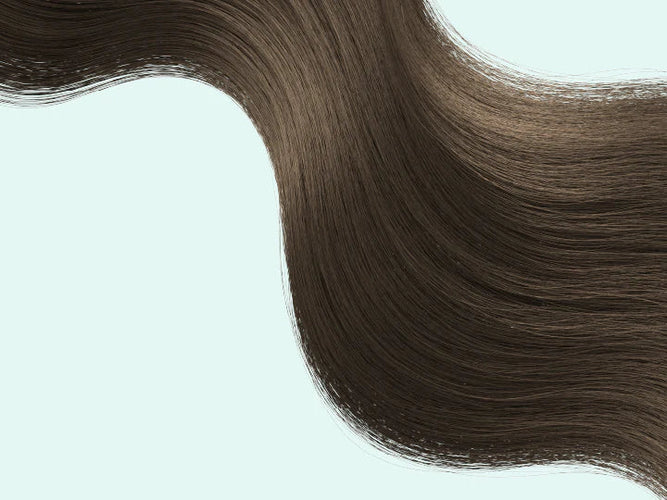- The role of the hair growth cycle in hair thickness
-
Want instant volume? See these styling and care tips
- Choose the right volumising shampoo and conditioner
- Recommended products
- Turn the tap a little cooler
- Cut back on heat
- Be gentle when brushing
- Use dry shampoos and texture sprays
- Your haircut and cutting technique
- Nutrition and supplements that support hair thickness
- Healthy lifestyle and stress reduction
- Scalp care
- Medical and cosmetic treatments
- Frequently Asked Questions About Thicker Hair
- Conclusion
- Resources
Would you love a full, thick head of hair? You are certainly not alone. For many men and women, fine or thinning hair can be a source of insecurity. In this blog, we share practical tips to make your hair look fuller and thicker: from smart styling tricks to simple lifestyle changes and must-have products.
The role of the hair growth cycle in hair thickness
First, a bit of theory about your hair: how does the hair growth cycle work? The thickness of your hair depends on how long and how strong the growth phase (the anagen phase) is. If this phase is shorter, hair often becomes finer and less dense, and you miss that full look. Want to know exactly how hair growth works and how you can improve it? Read our in-depth blog about the hair growth cycle.
Want instant volume? See these styling and care tips
So you have fine hair. Now what? We understand you would love thicker hair as soon as possible. That takes time, but you can quickly make your hair look fuller and healthier with these tips.
Choose the right volumising shampoo and conditioner

How you wash your hair, and what you use, can make a big difference to volume. It is best to choose products without heavy silicones that weigh hair down. Opt instead for formulas with proteins and polymers for extra strength. You can also use a targeted treatment for thinning hair.
Recommended products
Turn the tap a little cooler

There is nothing like a hot shower, we get it. But water that’s too hot isn’t great for your hair. It can leave it dry, brittle and prone to breakage. If your hair is already fine, that will not help. Wash with lukewarm water instead to help your hair retain moisture naturally.
Cut back on heat

Just like overly hot water, other heat is not kind to your hair. Try to skip heat tools as much as possible, they can damage the outer protective layer (cuticle), allowing moisture to escape. This makes hair more prone to breakage and split ends. If you do use a heat tool, always apply a heat protectant.
Be gentle when brushing

How you brush your hair effects its health. Hair is most vulnerable when wet, so take extra care. Always start at the ends and work gently towards the roots. The type of comb or brush you use matters too. The Neofollics Detangling Hair Brush helps to minimise breakage thanks to its dual-length teeth system, longer teeth to detangle and shorter teeth to smooth. It can also help stimulate the scalp by boosting circulation and lifting impurities from the scalp.
Use dry shampoos and texture sprays

Pump up the volume, for example, with dry shampoo. It absorbs excess sebum and gives your hair an instant volume boost. Texturising sprays add grip and hold. Note: this is a styling effect; it will not make your hair permanently thicker. We also advise not using dry shampoo too often, to avoid drying your hair out.
Your haircut and cutting technique

Did you know the way your hair is cut can make a big difference to perceived volume? Your hairdresser can help, for instance by adding layers. Regular trims also help prevent split ends. Left untreated, split ends can travel up the hair shaft and cause breakage.
Nutrition and supplements that support hair thickness
Healthy hair requires essential nutrients, such as:
• Biotin (also known as vitamin B7, B8 or BH): supports keratin production. Keratin is an essential protein and forms the basis of your hair. Biotin can be found in eggs, liver, milk, nuts and peanuts.
• Vitamin D: influences the hair follicle cycle. Oily fish such as herring and salmon naturally contain vitamin D. Meat and eggs also contain some vitamin D, but in smaller amounts.
• Zinc and iron: important for cell growth and repair. Zinc is found in small amounts in various foods such as meat, cheese, cereals, nuts and shellfish.
• Omega-3 fatty acids and proteins: contribute to a healthy hair structure. Omega-3s are found in foods such as oily fish and vegetable oils, or can be taken as a supplement (e.g., fish oil or flaxseed oil).
Always consult a doctor to check for deficiencies or excesses.
Healthy lifestyle and stress reduction
Do you suffer from telogen effluvium (hair loss caused by stress)? Regular exercise, getting enough sleep and reducing stress can help limit hair loss. It won’t make the hair fibre itself thicker, but by losing fewer hairs, your hair will appear fuller.
Regular exercise, quality sleep and stress management can help reduce stress-related hair loss (telogen effluvium). While this doesn’t make the hair shaft itself thicker, less hair loss can make your hair appear fuller.
Scalp care
Massage and microneedling can stimulate blood circulation and improve the absorption of hair growth treatments.
Recommended product
Medical and cosmetic treatments
• PRP therapy: In this treatment, a doctor takes a small sample of your blood. It is then separated within a machine so that only the plasma with many platelets remains. These platelets help your body to heal and grow. The doctor injects this plasma into your scalp, near the hair roots. This can make your hair follicles stronger and sometimes stimulate them to produce new hairs.
• Neofollics Hair Growth Stimulating Lotion: contains a combination of scientifically researched ingredients that support hair growth and stimulate the follicles. It can be used alone or alongside other treatments.
Medical and cosmetic treatments usually take several months before visible results appear, and their effectiveness varies. Results depend on the cause of hair loss, the health of the follicles, and consistent use.
Frequently Asked Questions About Thicker Hair
Can thin hair become thick again?
Yes, sometimes. It depends on the cause. With good care, healthy nutrition and sometimes medical treatments, your hair can become thicker and healthier.
Is hair thickness mainly genetic?
Your genes have a strong influence on how thick your hair is, but your environment, diet and hair care habits also play a role.
Can I prevent my hair from becoming thin?
You can’t always prevent thinning hair, especially if it’s genetic. However, you can reduce the risk by eating well, caring for your hair properly, and avoiding heat and harsh treatments.
Does cutting or shaving make hair thicker?
No, cutting or shaving doesn’t make your hair thicker. It can make it look healthier and fuller because split ends are removed, and the length is even.
Is thinning hair with age normal?
Yes, as you get older, your hair follicles can shrink, producing thinner hairs that grow more slowly. This is normal, but good care can help keep your hair as strong and full as possible.
Conclusion
Many people struggle with thin hair, which can affect their confidence. Fortunately, there are several tips to make your hair appear thicker, such as using dry shampoo or the right blow-drying technique. You can also take steps to make your hair thicker in the long term, for example through certain cosmetic treatments like PRP therapy, or by using hair growth–stimulating shampoos such as Neofollics Hair Growth Stimulating Shampoo.
It is of course important to investigate why your hair is thinning. Do you have telogen effluvium? A vitamin deficiency? Or perhaps you are using products that are too harsh on your hair or wearing it in tight hairstyles too often. By addressing the causes and having plenty of patience, you give your hair the best chance to become full and healthy again.
Resources
Almohanna, H. M., Ahmed, A. A., Tsatalis, J. P., & Tosti, A. (2019). The role of vitamins and minerals in hair loss: A review.
Draelos, Z. D. (2010). Hair cosmetics.
This information does not replace professional medical advice. If in doubt, always consult a doctor or specialist.













